
How Long Does a CPAP Machine Last?
Share
For individuals with obstructive sleep apnoea (OSA), a CPAP (continuous positive airway pressure) machine is an essential device that ensures consistent airflow during sleep. However, like any medical equipment, CPAP machines have a lifespan and require maintenance and eventual replacement. So, how long does a CPAP machine last? Let’s explore the factors influencing CPAP longevity, when to replace it, and how to extend its lifespan.
How Long Do CPAP Machines Last?
How long do CPAP machines last and how often should you replace them? On average, a CPAP machine lasts between 3 to 7 years, depending on the model, usage, and maintenance. Most manufacturers, including ResMed, suggest replacing CPAP machines every five years. However, the actual lifespan of a CPAP machine varies based on individual use and upkeep.
Insurance providers and healthcare professionals also typically recommend replacing a CPAP machine every five years. Many private insurance plans follow this replacement schedule, ensuring that users always have a properly functioning machine. But if your CPAP machine starts to show signs of wear before that, you may need a replacement sooner. CPAP machine lifespans typically range between 15,000 to 20,000 usage hours, meaning they can function effectively for many years with regular nightly use.
Signs That It’s Time to Replace Your CPAP Machine
If you’re wondering when to replace a CPAP machine, look out for these signs:
-
Decreased CPAP Pressure: If the machine struggles to maintain the prescribed air pressure, it may be failing.
-
Unusual Noises: A CPAP machine should run quietly. If it starts making loud or unusual sounds, the motor or internal components could be wearing out.
-
Frequent Air Leaks: Persistent air leaks, even with a properly fitted mask, may indicate that the machine is no longer sealing effectively.
-
Outdated Technology: CPAP technology continuously improves, with new models offering better comfort, efficiency, and data tracking.
-
Physical Damage: Cracks, broken buttons, or worn-out tubing can indicate that a replacement is needed.
How Often Should CPAP Equipment Be Replaced?
While the machine itself lasts several years, CPAP supplies and accessories need more frequent replacements to ensure optimal performance and hygiene. Here’s a recommended replacement schedule:
-
CPAP Mask: Replace every 3 to 6 months due to wear and tear.
-
CPAP Tubing: Replace every 3 months to prevent bacteria buildup.
-
CPAP Filter: Disposable filters should be replaced every month, while reusable filters should be cleaned regularly and replaced every 6 months.
-
Humidifier Water Chamber: Replace every 6 months to prevent mineral buildup and contamination.
-
CPAP Headgear and Chin Strap: Replace every 6 months as elasticity diminishes over time.
Factors Affecting CPAP Machine Lifespan
Several factors impact how long a CPAP machine lasts:
-
Usage Hours: A CPAP machine used nightly for 7-8 hours will experience more wear than one used less frequently.
-
Maintenance: Regularly cleaning and replacing CPAP equipment can extend the machine’s life.
-
Environmental Conditions: Exposure to dust, smoke, or pet hair can shorten the lifespan of a CPAP machine.
-
Quality of Equipment: Higher-end models, such as those from ResMed, often have longer lifespans than budget alternatives.
How to Extend the Life of Your CPAP Machine
If you want to maximize your CPAP machine’s lifespan, follow these maintenance tips:
-
Clean Your CPAP Equipment Regularly: Wash the mask, tubing, and humidifier chamber with mild soap and water weekly.
-
Use Distilled Water: Using distilled water in your CPAP humidifier prevents mineral buildup and extends the life of the machine.
-
Keep It in a Clean, Dry Place: Store your CPAP machine away from dust, smoke, and direct sunlight.
-
Check for Air Leaks: Regularly inspect tubing and connections to ensure proper airflow.
-
Follow Manufacturer Guidelines: Always adhere to the cleaning and replacement schedule recommended by the manufacturer.
How Long Does CPAP Gas Last?
If your CPAP machine includes an oxygen concentrator or blends with supplemental oxygen, you might wonder how long CPAP gas lasts. The duration depends on the oxygen source, but in general, home oxygen concentrators work indefinitely as long as they are powered and well-maintained. Portable oxygen tanks, however, have limited use based on their size and flow settings.
The Cost of Replacing a CPAP Machine
CPAP machines typically cost between $500 and $1,500, with high-end models like the ResMed AirSense 10 or AirSense 11 falling within the upper price range. Insurance may cover a portion of the cost, especially if you follow the recommended replacement timeline.
Final Thoughts
The average CPAP machine lifespan is 3 to 7 years, with most manufacturers recommending a replacement every five years. While CPAP machines are built to last, regular maintenance, proper cleaning, and timely replacement of CPAP supplies can extend their effectiveness. If you notice issues like reduced pressure, air leaks, or outdated features, it may be time to invest in a new CPAP machine. Ensuring you have a reliable CPAP setup is essential for maintaining good sleep health and managing obstructive sleep apnoea effectively.
